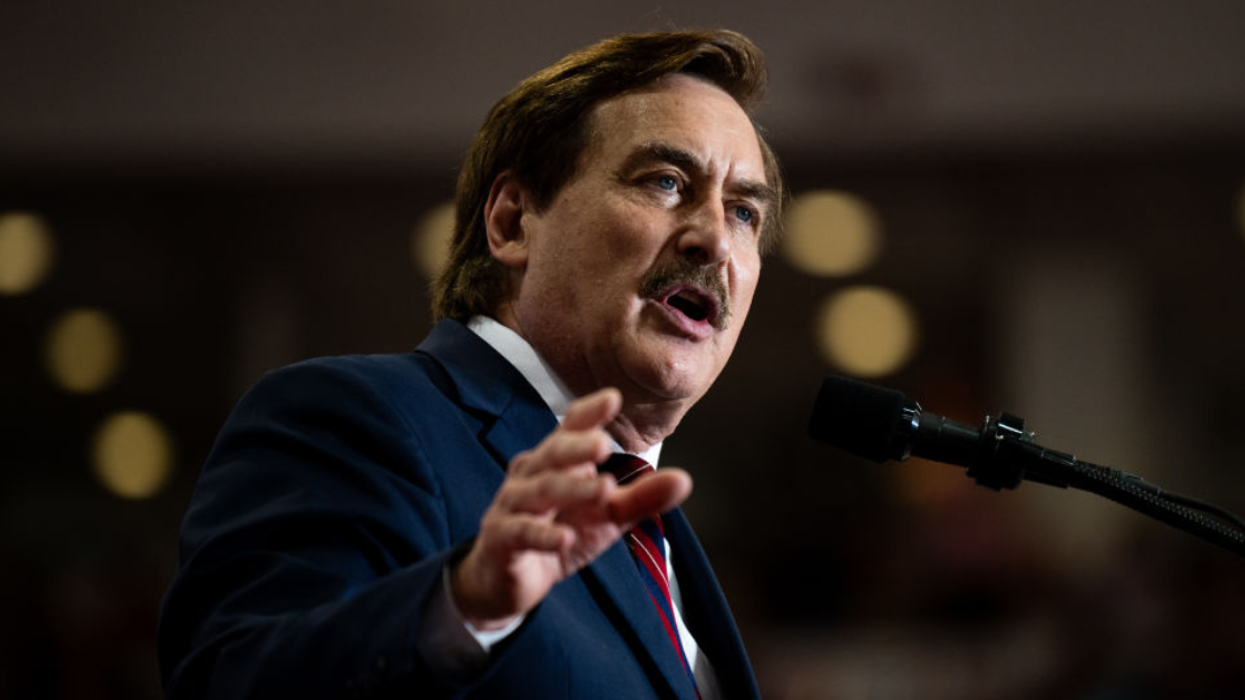MyPillow CEO Mike Lindell was mocked online after it emerged that he reportedly sobbed to a judge that he's "in ruins" and doesn't have the money to pay a court-ordered $50,000 fine to the voting software company Smartmatic, which he falsely claimed had rigged the 2020 election results in favor of former President Joe Biden.
Appearing via Zoom at a hearing in U.S. District Court in Washington, D.C., Lindell claimed Wednesday that he doesn’t even have “5 cents” to put toward the $56,396 he owes the company, telling the court he has “nothing” beyond two homes currently being liquidated and a truck. He has recently laid off hundreds of MyPillow employees due to what he described as severe financial distress.
Lindell also told the court that he and his company owe over $70 million in back taxes to the IRS. Judge Carl Nichols ordered Lindell to back up his statements with documentation and gave him until Friday to do so.
Lindell said:
“I borrowed everything I can. Nobody will lend me any money anymore. I can't turn back time... but I will tell you, I don’t have any money. I’m in ruins. I don’t have $5,000 or 5 cents." ...
"I have nothing to hide."
It was quite the fall from grace for one of President Donald Trump's most loyal conspiracy theorists—and the mockery was swift.
Lindell has previously claimed he was unfairly targeted for an IRS audit, and a Trump administration official reportedly took steps to intervene. According to three people familiar with the matter and an email obtained by The New York Times, David Eisner, a Treasury official, contacted a top IRS official in March expressing concern over Lindell’s situation.
Eisner wrote that Lindell, “a high-profile friend of the President,” had recently received an audit letter—“his second in two years”—and was “concerned that he may have been inappropriately targeted.” Eisner then signed off the message.
IRS officials did not act on the email directly but instead forwarded it to the agency’s inspector general. Still, the outreach raised alarm among IRS staff, who feared the Trump administration was pressuring the agency to shield the president’s allies from standard oversight.
Those concerns have deepened amid broader efforts to replace IRS leadership and steer the agency toward carrying out Trump’s directives.








 The Benny Show
The Benny Show





 @neilforreal/Bluesky
@neilforreal/Bluesky @savannahcat/Bluesky
@savannahcat/Bluesky @qadishtujessica.inanna.app
@qadishtujessica.inanna.app @v-ron/Bluesky
@v-ron/Bluesky @nelnelnellie/Bluesky
@nelnelnellie/Bluesky @beatlenumber9/Bluesky
@beatlenumber9/Bluesky @pinkzombierose/Bluesky
@pinkzombierose/Bluesky
 @theunobsolete/TikTok
@theunobsolete/TikTok @theunobsolete/TikTok
@theunobsolete/TikTok @theunobsolete/TikTok
@theunobsolete/TikTok @theunobsolete/TikTok
@theunobsolete/TikTok @theunobsolete/TikTok
@theunobsolete/TikTok @theunobsolete/TikTok
@theunobsolete/TikTok @theunobsolete/TikTok
@theunobsolete/TikTok @theunobsolete/TikTok
@theunobsolete/TikTok @theunobsolete/TikTok
@theunobsolete/TikTok @theunobsolete/TikTok
@theunobsolete/TikTok @theunobsolete/TikTok
@theunobsolete/TikTok @theunobsolete/TikTok
@theunobsolete/TikTok @theunobsolete/TikTok
@theunobsolete/TikTok @theunobsolete/TikTok
@theunobsolete/TikTok @theunobsolete/TikTok
@theunobsolete/TikTok @theunobsolete/TikTok
@theunobsolete/TikTok @theunobsolete/TikTok
@theunobsolete/TikTok
 @laysuperstar/TikTok
@laysuperstar/TikTok @laysuperstar/TikTok
@laysuperstar/TikTok @laysuperstar/TikTok
@laysuperstar/TikTok @laysuperstar/TikTok
@laysuperstar/TikTok @laysuperstar/TikTok
@laysuperstar/TikTok @laysuperstar/TikTok
@laysuperstar/TikTok @laysuperstar/TikTok
@laysuperstar/TikTok @laysuperstar/TikTok
@laysuperstar/TikTok @laysuperstar/TikTok
@laysuperstar/TikTok @laysuperstar/TikTok
@laysuperstar/TikTok @laysuperstar/TikTok
@laysuperstar/TikTok @laysuperstar/TikTok
@laysuperstar/TikTok @laysuperstar/TikTok
@laysuperstar/TikTok @laysuperstar/TikTok
@laysuperstar/TikTok @laysuperstar/TikTok
@laysuperstar/TikTok